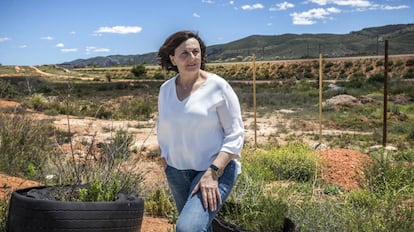How a failed “inland sea” project made this Spain’s most debt-ridden village
Vallada is home to just over 3,000 people but is saddled with up to €37 million in debt thanks to a ruinous scheme put forward by the former mayor

María José Tortosa, the current mayor of Vallada, shields her eyes as she points towards the horizon. “The park was going to be all that and more, 1,300 square kilometers,” she says. “The first stone was laid more than 10 years ago and you can see how it’s turned out.”
They should not have got the town into debt for land that is completely worthless
Retired farmer Rafael Guzmán
Tortosa stands on the edge of a piece of tarmac where the vast expanse of wasteland begins. There is a huge weather-beaten sign that says “Valpark” and a strong fragrance in the air from the ubiquitous broom shrubs.
Welcome to Vallada, a municipality with a population of 3,030 and the biggest debt per capita in Spain – somewhere between €25.5 million and €37 million, with each resident owing between €8,444 and €12,239. The debt stands at around 1,000% of the council’s income, meaning that the authorities have been forced to introduce austerity measures – two out of three street lights are turned off and the budget for the village’s fiestas has been reduced to the minimum. The land was meant to be converted into a vast nautical park under the vision of Popular Party (PP) mayor Fernando Giner, despite the fact that Vallada is 70 kilometers from the coast.
Giner planned the project when it was announced that the America’s Cup sailing regatta would take place in Valencia. Determined to take advantage of the news, Giner came up with “La mar de dins” (or the inland sea) – a project consisting of a shipyard, dry dock and a sailing school as well as an extensive service area with a 10-story hotel.
“At the time, it was an opportunity,” says Giner, a teacher who was mayor of Vallada for Unión Valenciana and later the PP for 24 years, as well as president of Valencia’s provincial authority for two terms.
Money was spent on work that was never carried out and services were paid for twice
The glamorous sailing championship came and went, however, without so much as a nod to Giner’s venture and the thousands of square kilometers acquired by Vallada Town Hall. Giner then came up with Plan B: a logistics park called Valpark. “It was thwarted as so many projects were,” says Giner, who is now retired. “What I regret is that the crisis happened.”
The Valencia regional government and the local PP and Socialist Party (PSOE) candidates – the only parties running at the local elections on May 26 – paradoxically believe the park is the main chance the village has of emerging from its saddling debt.
“Investors have been approaching us,” says Tortosa, who supplements her job as mayor, for which she doesn’t earn a salary, by working as a nurse. “Right now there’s one interested in buying 200,000 m2, but on condition the company can be located here by 2021. And that’s the catch. We can’t sell it to them because we don’t have the money to develop the land. If we did, companies would come.”
The Valencian regional government is looking into the possibility of buying Valpark or at least helping Vallada to make money out of it, and is currently weighing the cost of finishing the project, which would be at least €10 million.
What I regret is that it led to a crisis
Former mayor Fernando Giner
“We want the region of Valencia to be a reference point for distribution companies and that means the chance to invest in large areas of land,” says María José Mira, of the regional finance department. “Vallada is well located, with a highway and a rail line close by. But the park’s design was poorly managed; there was a lack of budgetary control and, it appears, other more serious issues.”
An audit of Valpark revealed that money was spent on work that was never carried out and services were paid for twice. The company involved in the scandal has agreed to return €4.2 million to Vallada to avoid being prosecuted. Meanwhile, the Audit Court is demanding €1.4 million from Giner, his successor Vicente Perales (from the party Independent Alternatives for Vallada), and the former municipal secretary, Ricardo Martínez.
None of the 10 locals in Vallada who were asked about the PP’s chances of returning to power in the upcoming local elections believe they have a shot. “Everyone is very angry with them,” says Rafael Guzmán, a retired farm worker and truck driver. “They should not have got the town into debt for land that is completely worthless.”
English version by Heather Galloway.
Tu suscripción se está usando en otro dispositivo
¿Quieres añadir otro usuario a tu suscripción?
Si continúas leyendo en este dispositivo, no se podrá leer en el otro.
FlechaTu suscripción se está usando en otro dispositivo y solo puedes acceder a EL PAÍS desde un dispositivo a la vez.
Si quieres compartir tu cuenta, cambia tu suscripción a la modalidad Premium, así podrás añadir otro usuario. Cada uno accederá con su propia cuenta de email, lo que os permitirá personalizar vuestra experiencia en EL PAÍS.
¿Tienes una suscripción de empresa? Accede aquí para contratar más cuentas.
En el caso de no saber quién está usando tu cuenta, te recomendamos cambiar tu contraseña aquí.
Si decides continuar compartiendo tu cuenta, este mensaje se mostrará en tu dispositivo y en el de la otra persona que está usando tu cuenta de forma indefinida, afectando a tu experiencia de lectura. Puedes consultar aquí los términos y condiciones de la suscripción digital.









































